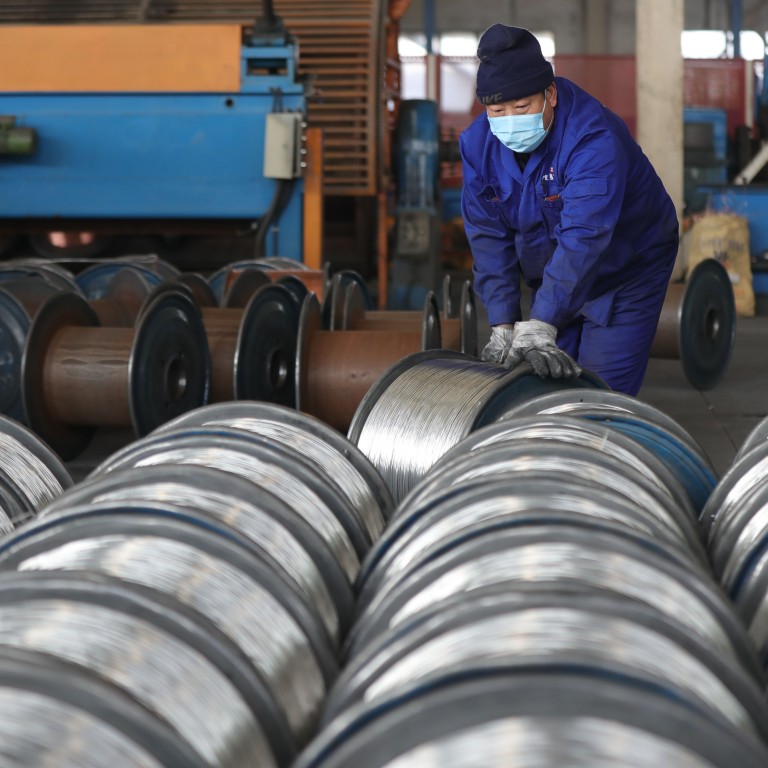
Coronavirus is a ‘human tragedy’ that poses sharp risks to global economic recovery, IMF says
- China’s outlook in the near term will largely depend on a successful containment of the virus, says the ‘G20 Surveillance Note’ from the International Monetary Fund
- And while global growth appears to be bottoming out, the projected recovery – an increase from 2.9 per cent in 2019 to 3.3 per cent – is seen as fragile and shallow
Further spread of the coronavirus could pose sharp downside risks and derail the recovery of global growth, according to a new report by the International Monetary Fund.
China’s outlook in the near term will largely depend on a successful containment of the coronavirus, with the current scenario, which is broadly in line with similar experiences in the past such as the severe acute respiratory syndrome (Sars) outbreak in 2002–03, suggesting the disruption of economic activity will be followed by a period of stronger catch-up growth from pent-up demand, according to Johannes Eugster, economist in the multilateral surveillance division of the International Monetary Fund’s (IMF) research department.
But if the impact turns out to be larger and longer lasting, it could pose risks to global growth, Eugster said in a “G20 Surveillance Note” ahead of the G20 Finance Ministers and Central Bank Governors’ meetings to be held over the weekend in Riyadh, Saudi Arabia.
A wider and more protracted outbreak or lingering uncertainty about contagion could intensify supply chain disruptions and depress confidence more persistently, making the global impact more severe
Spillovers to other countries are likely through tourism, supply chains, and commodity price effects, while challenges is likely to persist related to a structural decline in demand for cars and mobile phones, making these sectors unlikely sources of strong growth going forward, Eugster added.
“Notably, the impact of the coronavirus is still unfolding, and a variety of scenarios could emerge,” Eugster said. “A wider and more protracted outbreak or lingering uncertainty about contagion could intensify supply chain disruptions and depress confidence more persistently, making the global impact more severe.”
Therefore, while global growth appears to be bottoming out, the projected recovery in global growth – an increase from 2.9 per cent in 2019 to 3.3 per cent in 2020 – is a fragile and shallow one, Eugster added.
While the trade deal between the US and China somewhat reduced short-term uncertainty, the deal does not roll back the full set of recently imposed tariffs, meaning trade restrictions and lingering uncertainty over policy continue to act as a drag on investment and sentiment, Eugster said.
Other headwinds that could hold back growth could be triggered by cyberattacks, an escalation of geopolitical tensions in the Middle East, a rise in protectionism and retreat from multilateralism could also lead to technological decoupling and the unravelling of global production chains, resulting in lower productivity growth going forward, according to Eugster.
Persistent or increasing inequality could destabilise the political and social fabric and weaken the support for necessary growth-enhancing reforms, while social unrest including in Hong Kong, Iraq, Chile, Lebanon, has contributed to a reassessment of their economic prospects.
“Social discontent causes economic disruptions, loss of confidence and to policy missteps,” Eugster said.
For emerging market economies such as China, there is room to raise productivity by further strengthening market forces and reducing the role of the state in the economy as well as by liberalising trade and foreign investment, while l abour market reforms should focus on increasing mobility, Eugster said.
Collaboration has been – and will continue to be – essential to save lives in the first place, but also to contain the economic damage and strengthen our capacities to react to future epidemics wherever they may occur
Domestic policies, though, will be insufficient to significantly raise growth if not complemented by multilateral efforts to address common challenges.
Multilateral cooperation is essential to safeguard global integration, while global collaboration is essential to the containment of the coronavirus and its costs, Eugster said.
“Collaboration has been – and will continue to be – essential to save lives in the first place, but also to contain the economic damage and strengthen our capacities to react to future epidemics wherever they may occur,” Eugster said.
More is also needed after the US-China phase one agreement, as the deal only partly reduces the overall damage and contains provisions such as bilateral purchase agreements that create additional costs, including for third countries, through trade diversion, Eugster said.
To durably de-escalate tensions and restore investors’ confidence in the rules-based economic order, recently imposed barriers to trade need to be fully reversed and provisions of managed trade removed.
On Wednesday, officials confirmed that China’s central bank and its finance ministry will not send any representatives to the G20 meeting of finance ministers and central bank governors in Riyadh due to virus outbreak.
But Chinese representatives at the World Bank will attend the meeting, an official at the finance ministry said.
Additional reporting by Reuters
Purchase the China AI Report 2020 brought to you by SCMP Research and enjoy a 20% discount (original price US$400). This 60-page all new intelligence report gives you first-hand insights and analysis into the latest industry developments and intelligence about China AI. Get exclusive access to our webinars for continuous learning, and interact with China AI executives in live Q&A. Offer valid until 31 March 2020.

